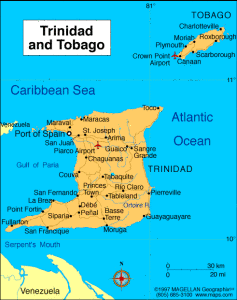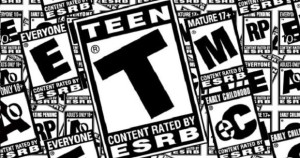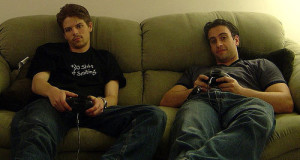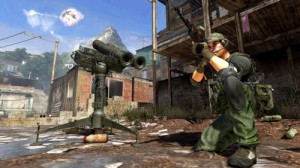Interview with the Trophy Hunter
(Editor’s note: this article was originally published on May 19, 2013. Given the recent announcement of trophy support for PlayStation Home, we are rerunning this story.)
by SealWyf, HSM editor
and hondahoe_, OCD gamer
It was one of those fortuitous encounters that are so common in Home. I was chatting with a friend in the Mall when we were approached by a female avatar in default clothing. Soon the three of us were discussing the nature of Home, whether it can be viewed as a game in its own right, Sony’s changing role in Home maintenance and development, and why an intelligent adult might choose to spend a lot of time here, to the exclusion of most other forms of gaming.
We learned that our questioner was a male in his thirties — we had already deduced as much from his speech patterns and clothing choice. His profile made it clear that he is in the top fractional percent of PSN gamers worldwide. By his own admission, he has spent very little time in Home. He saw no value in it, and was honestly curious why other people might enjoy it.
I had already mentioned HSM as an example of the spin-off media projects that extend Home’s reach into the real world, or at least the Internet. On impulse, I asked if he would do an interview for the Magazine, to share his unique perspective. He graciously consented, and a few weeks later we met in a voice chat room on the PSN. Since I have no way to record audio, and it would have been hard to transcribe our two hours of free-form conversation into a compact Q&A format, what follows is a reconstructed narrative, based on my handwritten notes.
“Please tell us something about yourself,” I prompted.
His PSN screen name is hondahoe_. His real first name is Brent. (To preserve his privacy, I’m not sharing his full name.) He was in Home’s closed beta, but he found nothing of interest there, and he didn’t stay. In fact, our encounter in the Mall was the first time he had been in Home for a very long time.
 Brent is a 34-year-old professional who lives in Trinidad, the larger of the two islands that make up the nation of Trinidad and Tobago, in the far southeastern Caribbean. He works as a logistics coordinator for a major distribution company.
Brent is a 34-year-old professional who lives in Trinidad, the larger of the two islands that make up the nation of Trinidad and Tobago, in the far southeastern Caribbean. He works as a logistics coordinator for a major distribution company.
This puzzled me — I knew what the words meant, but the concept was unfamiliar. Brent explained that when you live in a small island nation, things don’t just show up — they have to be imported. And that means someone needs to handle the ordering process, the shipping arrangements, the customs paperwork, and all the rest of it. Brent’s particular responsibility is pharmaceuticals. It’s a job that carries a lot of responsibility.
That’s his day job. I can verify that he spends most of his evenings on the PlayStation Network. So do I, and he’s usually there, working on some game. He’s been console gaming since he was about ten years old. His first console was a Nintendo, where his favorite games were Super Mario Brothers, Battle Toads, Super Contra and The Simpsons. He also had occasional access to an Atari 2600 that belonged to a friend of his older sister, where he was able to play the early classic games, such as Pole Position, PacMan and Space Invaders.
In Trinidad, games are expensive, since everything has to be imported. And of course Brent’s parents didn’t see building his gaming library as a top priority — gaming was just a waste of time, something that children did to amuse themselves when they were not doing something useful. So he and his friends pooled their resources and shared the games they owned. He first played Castlevania on a borrowed copy.
After the Nintendo came the Super Nintendo, with Super Mario World, Street Fighters, and other fighting games, a genre he soon came to enjoy. Then he moved on to the Sony consoles, starting with the PS1.
Unlike many avid gamers, who have whole libraries of hardware, Brent has always owned one console at a time. The Sony consoles captured his loyalty, starting with the PS1. By the time the PS2 arrived, he had started working and could buy his own games — as many games as he wanted. Since then, he has never looked back. From the PS2, he moved on to the PS3, and is looking forward to the PS4.
Over the years, Brent has seen games, and society’s assumptions about gaming, change radically. His family thought gaming was something he would outgrow when he became an adult. This was a common view at the time. But, as ESRB ratings demonstrate, many games are now specifically aimed at an adult market. The gamer demographic is getting older, and also more diverse. Girls and women are moving into what used to be a boys’ entertainment.
 But old assumptions change slowly. Even now, the young gamers Brent meets online are surprised to learn that he is in his 30’s. He knows many gamers in their 40’s, and some who are even older. (Indeed, he did not seem at all shocked when I told him my age, during that first meeting in Home.) As an adult with a responsible job, gaming is a welcome recreation, something he makes time for. When a long weekend approaches, many of his friends are planning trips to the beach — but Brent looks forward to spending serious time buried in a game or getting together with his online friends. Exploring new games, and increasing his trophy count, have become important parts of his life.
But old assumptions change slowly. Even now, the young gamers Brent meets online are surprised to learn that he is in his 30’s. He knows many gamers in their 40’s, and some who are even older. (Indeed, he did not seem at all shocked when I told him my age, during that first meeting in Home.) As an adult with a responsible job, gaming is a welcome recreation, something he makes time for. When a long weekend approaches, many of his friends are planning trips to the beach — but Brent looks forward to spending serious time buried in a game or getting together with his online friends. Exploring new games, and increasing his trophy count, have become important parts of his life.
“Can you share some thoughts on Home?” I asked. It was a topic we had discussed extensively in that first meeting in the Mall, and it was one of the reasons I had wanted to get his input for the Magazine.
To be honest, he admitted, his opinion of Home was very poor. Most gamers in his circle wonder why Sony still bothers to support it, when their resources could be better spent creating new game content. (Many people are unaware that Sony does little of the actual content development for Home, which has been passed on to the third-party developers.)
The view from the outside is that Home is a ghost town, not a place for serious gamers. This can apparently be confirmed by checking the profiles of Home users. Most will have a PSN level of five or below, with a very low trophy count and few Platinums — they obviously not serious console users. Brent was surprised to discover that, despite their apparent casualness in the gaming world, many Home users take their virtual community very seriously. Those of us who “get” the place see it as a “social MMO”, a new and growing class of online game.
“Tell us about trophies,” I prompted. “What’s the attraction?”
 Trophies, Brent explained, are a new phenomenon in gaming. In old school gaming — and he considers himself an old school gamer — it’s all about beating your friends. They come to your house, and you sit on the couch together, competing to get the higher score or the faster time. What happened in the gaming session was everything. There was no way to document your solo achievements. You might tell your friends that you had gotten a faster time than they did, when they weren’t around to see it. But they probably wouldn’t believe you. Trophies have changed that. They are a permanent record of achievement.
Trophies, Brent explained, are a new phenomenon in gaming. In old school gaming — and he considers himself an old school gamer — it’s all about beating your friends. They come to your house, and you sit on the couch together, competing to get the higher score or the faster time. What happened in the gaming session was everything. There was no way to document your solo achievements. You might tell your friends that you had gotten a faster time than they did, when they weren’t around to see it. But they probably wouldn’t believe you. Trophies have changed that. They are a permanent record of achievement.
“I see myself as an OCD gamer,” Brent admitted. “Trophies validate my accomplishments.” And they are impressive accomplishments indeed. Since our first meeting, he has reached level 30. In fact, he waited to pass that milestone before he scheduled our interview. Thirty is a good round number.
“Having reached level 30, what is your next goal?” I asked. I expected him to say something like “Level 35″. His answer surprised me.
“I’m waiting for the PS4,” Brent replied. “To be honest, I’m somewhat burned out at present.”
But he’s not just sitting on his laurels. Brent is part of the trophy-hunter community on the web, a spin-off Internet presence he compared to HomeStation Magazine. I think it’s a good comparison. Like the Home community, the PSN trophy-hunter community has created its own Internet extensions to assist other gamers, work with their friends, and provide new ways to build status. There are a number of websites dedicated to avid PSN trophy hunters. The one on which Brent is most active is PS3Trophies.org, usually abbreviated “PS3T” in conversation. This is the largest of the trophy-hunters’ websites, and it is important enough that game developers work with it to develop trophy lists.
The PS3T website includes forums, game reviews and their core product — guides for trophy hunters. Creating trophy guides is a way of earning status in the community as well as assisting other gamers. These guides are not traditional game walkthroughs. They don’t tell you how to play the game — just how to earn the trophies associated with it, especially the ones you might miss during normal, casual gameplay. Brent has co-authored a trophy guide to Ico.
We had now been talking for almost two hours. It was getting late, and I wanted to bring the interview to a close. “So how could Sony improve Home, to bring in more traditional gamers?” I asked. I expected Brent, an avid trophy hunter, to suggest Home-based trophies. Again, his answer surprised me.
Rewards in Home, he pointed out, are only useful to Home users. You get apartments, clothes, things you can only use in Home. Traditional gamers want rewards that they can use in games, such as free DLC, exclusive avatars, and game items.
“But what about trophies?” I prompted. Surely this was something that a trophy-hunter would see as desirable.
Brent was skeptical. Hard-core trophy hunters, he admitted, are a minority — a tiny percentage of PSN gamers, perhaps equivalent to the hard-core Home users in total number. And a trophy hunter will only play a game until he or she was won all the trophies. Then they move on.
“I don’t want to call us an ‘elite’,” Brent said. Though he obviously thinks of them — and himself — as an exclusive community. At level 30, Brent is among the top 2,000 PSN gamers in the world. Since there are over 70 million PSN gamers, it’s not unreasonable to use the word “elite” to describe his achievements. He is truly an “OCD trophy hunter”. But perhaps he is no more typical of the gaming community than us, the hardcore Home addicts — the relatively small number of Home’s users who read and write about Home, create machinima, run events, collect rewards and rise through the ranks of Home’s user-created organizations. We are none of us quite “normal”. And I mean that in the most positive sense.
 Returning to my original question, Brent explained further. Unlike avid trophy hunters, most gamers will play a game as long as they enjoy it. They will even play games that don’t offer trophies at all, just for the gaming pleasure. For example, Call of Duty, which is a very popular FPS, has no trophies in its online version. But people play it with great enthusiasm, and spend many hours on it — a dedication that is not reflected in their PSN level or trophy count.
Returning to my original question, Brent explained further. Unlike avid trophy hunters, most gamers will play a game as long as they enjoy it. They will even play games that don’t offer trophies at all, just for the gaming pleasure. For example, Call of Duty, which is a very popular FPS, has no trophies in its online version. But people play it with great enthusiasm, and spend many hours on it — a dedication that is not reflected in their PSN level or trophy count.
So, trophies might not be the best way to lure people into Home. The challenge is to get them on long enough to discover the attractions of community that Home offers, so they will stay. Other gaming content — free DLC, free avatars, and the like — might be the best way to do this.
“This has been a great interview. Can you give us some final thoughts?” I was sorry to steer the evening toward its close, but it was a work night and both of us needed to sleep.
Brent admitted that he has chosen a challenging path in becoming a trophy hunter. It’s not always fun. He has played games he hated, just to wring the trophies out of them. On the other hand, he has sometimes been pleasantly surprised by a game he expected to hate.
 A recent example is Lollipop Chainsaw. The premise — a high school cheerleader fighting zombies — didn’t appeal to him, and he would not have bought the game at all except for its trophy count. However, he ended up thoroughly enjoying it, and it has become one of his favorite games of the 2012 season.
A recent example is Lollipop Chainsaw. The premise — a high school cheerleader fighting zombies — didn’t appeal to him, and he would not have bought the game at all except for its trophy count. However, he ended up thoroughly enjoying it, and it has become one of his favorite games of the 2012 season.
And there are rewards to trophy hunting besides just racking up the numbers. When he receives that final Plat, Brent has the satisfaction of knowing that he has experienced everything a game has to offer. He now has 128 Platinum trophies. This means that he has played at least 128 games completely — not just to the point of seeing the final credits, but exploring everything the developers put into it. This is a major accomplishment.
Incredibly, he has recently created a new account and will be starting over, just to have the chance of experiencing it all again. His friends think he is a little crazy to do this, but the idea attracts him. It won’t take him long to rebuild his numbers. For one thing, he already knows the games, so he can complete them quickly.
And he hasn’t been doing this for as long as you might expect. He actually won his first Platinum in 2010. He had been playing Call of Duty online with a 17-year-old female gamer. She interrupted her online play to work through God of War. But she was still playing it long after she should have completed the game. “Do you really love God of War that much?” he asked her.
 She said she liked the game well enough, but that now she was going for the Platinum. This surprised Brent — he had never considered Platinum trophies something he could aspire to. But if this young girl could do it, so could he.
She said she liked the game well enough, but that now she was going for the Platinum. This surprised Brent — he had never considered Platinum trophies something he could aspire to. But if this young girl could do it, so could he.
He never looked back. “She created a monster,” he laughed.
Perhaps. But I’ve never spent an evening with a more engaging “monster”.
Share
| Tweet |





Nice interview.
I’ve always considered the trophy system of the PS3 a missed opportunity. If you combined Home with the trophies, they’d make much more sense -- they’d become actual rewards rather than just bragging rights. Although Batman Arkham Asylum just gives you a whole Bat-Cave for simply owning the game, imagine how proud you could be of that space for “plating” the game instead. This, I always thought, would be the very thing that integrates Home with the games on the system.
Mount Olypus for getting so many gold trophies from God of War? A personal WipEout space for X amount of trophies gained? Or how about those Motorstorm jeans I love for hitting a certain trophy count?
The missed opportunities for pulling gamers into Home are now so vast and so many, well, it’s just embarrassing really.
Sorry Sony me old mukka, but you didnt just drop the ball on this one, you let it slip down a damn man-hole and be devoured by urban-legend-sized crocodiles.
A friend of mine, King Chile, whom I wrote an article about a long time back is another who chases game trophies. He may be well known in the hunter community, I am not certain. Currently he is level 39 with 174 plats and a total of 10,118 trophies. People that do this are very dedicated. King rarely comes into Home anymore, I haven’t seen him in ages actually. Sony needs to think of something to get these people here, and I think that using Home to give gamers a little extra something within the game they are playing is a good one, perhaps make it a trophy to obtain the added content for visiting Home and getting said object. This would bring all plat hunters in to get their plats.
Nice article Seal.
Thanks, Krazy and Burbie. I still think that trophies in Home would be a good idea. And what would it cost Sony? I can’t imagine that it would be all that hard to implement. You have to wonder why this has never happened.
Brent will be posting the link to this article on the PS3T site, so we may have a lot of avid trophy hunters reading about Home for the first time. I encourage them to check out the other stories on HSM. Home is a very interesting place, for those of us who “live” here.
http://www.ps3trophies.org/forum/general-ps3-discussion/198905-my-random-encounter-playstation-home.html
A “charming elderly lady” indeed. I think I’ve just received my revenge for referring to him as an “engaging ‘monster’.”
Good article! Just wanted to point out one tiny mistake you guys made: is name is actually hondahole as many of his PS3T buddies like me can tell you. He just hasn’t been able to change it since Sony doesn’t have any method for changing your PSN ID yet. :p
Haha I’m just bust his chops. But I am quite serious about this being a good article. Like honda, I didn’t get into Home either. Tried it a few times, left after a couple hours after each time and eventually never looked back. I was actually surprised rather recently to learn that Home was still up and running. With how little press Sony has given it in more recent times (to the point where if they’ve done any at all, I hadn’t seen it), I had just assumed everyone had lost interest and it had been shut down.
And yeah, Home might be more appealing if it had any kind of influence for itself outside home. A simple comparison would be to 360’s avatars: there is no 360 version of Home, but every user creates an avatar and you see the avatars when you look at your friends list or whatever. And some 360 games have unlockable avatar awards so you can dress your avatar in a Gears of War shirt or a Crackdown armor suit (or one of my favorites, a half a pair of pants for You Don’t Know Jack) for anyone who looks at your profile to see. It’s not anything extraordinary that will make people buy a 360 over a PS3 or anything, but it’s still a neat little thing that other people can easy see. If Home had something like that which carried out into your main PSN profile for everyone to see regardless of if they use Home, I might become more interested in it.
P.S. HONDAHOLE =D
Seal this is a great article!! I always actually kind of wondered why trophies were such a huge deal although I enjoy getting them myself. but if home got trophies then that would bring so many players to Home. Because the PS3 is almost all about trophies, everybody aims to get trophies on the PS3 so if they were in Home, then the amount of users in Home would increase dramatically. Again great piece, and shout out to Hondahole, good stuff!And it’s amazing how much home has evolved since the closed beta at the beginning of the open beta.
“http://www.youtube.com/watch?v=C_VheAwZBuQ”
Yes! hondahole 4 life!
An interesting article.
To each their own (I’m not a gamer, I’ve tried a few and played a little) but I find it a bit strange that someone would play a game they don’t like just a win a trophy. But maybe I’ve done something similar on Home?
What’s even scarier is that we play a game we don’t like, to win a reward we don’t want. This is the point we realize that we are NOT rational beings.
Very nice article. I linked to this article via honda’s post on PS3T. I’ve never even been into Home so this was kinda an eye opener for me. Maybe just enough to make me stop by…
Again…great read Seal!
Thanks, sum1. If you do decide to come see Home, drop me an XMB note and I’ll play tour guide.
Great read, found out about this from hondaholes post over on ps3t. Never been a big fan of home but its cool that people can meet new friends on it. I prefer trophy hunting over making new friends though.
It is appropriate that I first learned about Home’s foray into PSN trophies from Brent, the subject of this interview. I have stayed on the PS3 and he has moved on to the PS4, but we still exchange the occasional note over PSN, mostly of the “Hi, how’s it going?” variety. But this note was a complete surprise: “So Home has trophies now.” Really? I thought. And I headed over to take a look.
Home feels surreal to someone who has been elsewhere for several months. I had nearly forgotten about chronic lag and endless load times. They’re annoying, but I’ll have to visit at least 50 times to get that Gold, especially since Brent keeps nagging me to win all the Home trophies, for his sake if not my own.
I figure I’m not alone in this return-to-Home disorientation. Trophies, especially easy-to-earn ones, are gamer bait, and they’ll bring in lapsed Home players as well as new ones. I just wish they had been added much, much earlier.